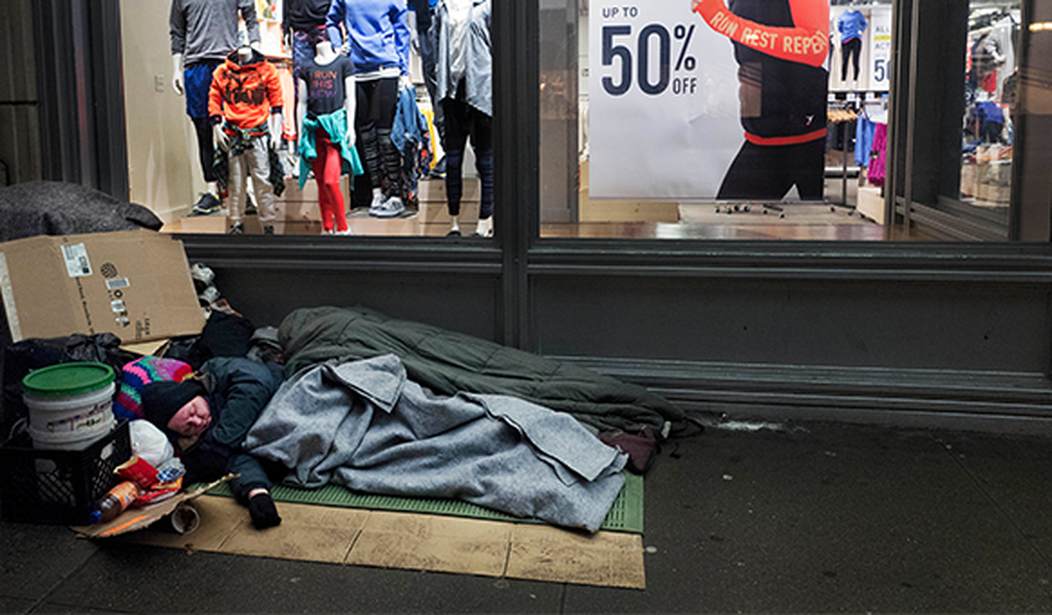Tampa, Fla., has an overwhelming homeless population. The city would like to believe only 2,040 of its residents are “experiencing homelessness,” but the numbers don’t add up, considering that 11 years ago the estimate was 16,000.
But then again, back in 2012, the GOP held its national convention in Tampa, so it was in the left’s best interest to get the highest number possible for the local homeless. Look at the greedy Republicans coming into the land of the downtrodden, spending their dirty oil money on luxury hotels and restaurants, and then leaving without so much as even looking at the real Tampa. Did the media say that exactly? No, but they might as well have — CBS even found a couple from Texas to interview.
The problem with Tampa’s numbers traces back to who is in charge: Democrats. They have to look good, especially when they have an openly gay, white female mayor at the helm whose intended legacy is to transform Tampa from a dingy port town to a glittery Miami rival, or something. But how much confetti are the partisan hacks willing to throw over the truth?
Look no further than their 2023 Homeless Point-In-Time Count. They took one single day and some volunteers “to sample parts of the county and extrapolate a valid estimate of how many homeless neighbors we have in our community.” Pardon me while I gag myself with a spoon.
While the left plays games with statistics and semantics, there is a reason homeless people don’t ask each other, “Where do you live?” Rather, the question is, “Where do you stay?” Everything is transient. Everything is uncertain. No one lives anywhere; they stay in alcoves and in wooded medians, on bus stop benches, in a shelter on a cot if they can find the $15 to afford it.
My friend Mark is 64 years old and lost his management job, benefits, retirement, and savings eight years ago when he was diagnosed with lung cancer. Unable to pay his rent or find another job (because no one wants to hire a man nearing retirement age who also has cancer), he found himself in a shelter and then on the streets. Four days a week, he asks for handouts at an intersection near my office. He is one of at least a dozen “regulars” I see on that road, and there are dozens of those roads all over my little corner of the city.
Is he sheltered? Yes, even if it means he doesn’t eat for a few days. Mark is sheltered but still homeless, and none of the Tampa elite want to call him their “neighbor.”
The left is shamelessly pushing this “people experiencing homelessness” line. They’ll tell us we shouldn’t label people by their circumstances, but let’s be honest: those peddling the narrative are willfully oblivious to the reality they seek to sugarcoat because the thought of actually looking at the truth makes them extraordinarily uncomfortable. They have never been, and hopefully will never be, homeless.
Living in a constant state of insecurity changes you. Experiencing something is a passive verb, something that happens to you; it sounds victim-ish, which is right in line with the leftist way of thinking. But being homeless is not a passive verb — it is a way of living that defines a part of you. Just like cancer survivors didn’t simply “experience cancer,” they dug deep into the wells of their willpower, resources, networks, faith, and ability to beat it. They are never the same after that because it was a life-and-death season full of uncertainty and fear.
I grew up with a silver spoon in my mouth and another in my hand. My parents provided the best of everything, from education to food to the mansion we lived in on a gated street. Yet, there was a part of my life where I was, in fact, homeless.
I did not have a permanent dwelling where I could go for refuge, comfort, and safety. Privacy and hygiene became luxuries. I did not have a place where I could store and access goods because I was living in my car. I was moving around all the time, from one parking lot to another. My situation changed so suddenly that I still had a couple of weeks left on a gym membership, so that was where I showered for a while. So quickly did I lose everything that I didn’t have time to dry the clothes that were in the washing machine, so I put them in a garbage bag and took them with me. It was August in Texas; everything molded in the trunk of my car.
My finances were tied up in attorneys and legal proceedings, so I didn’t have access to much money. I found myself in a very unexpected and tumultuous relationship with security — even though I had a job! I went to the office every day, but I will tell you that if I wasn’t at the office, I was scared out of my mind because I was a young 20-something with nowhere to go. My family was not in a position to help or even know about my situation.
Fortunately, with the help of some very generous people, I was able to get back on my feet with a small apartment. Before all that, I never knew I could be so grateful for a mattress on the floor or a washer and dryer, refrigerator, or place to brush my teeth. Let me tell you, even years later, a memory of baby wipe baths pops up every time I get in a hot shower with a loofa and soap.
Being homeless changed me. That kind of life changes the people who live it. I didn’t have it nearly as bad as most because I never had to beg or go through a dumpster to find a meal. I never felt invisible standing in the middle of the busy city. No one ever assumed I was lazy or crazy or a drug addict.
Exclusively for our VIPs: Homelessness Has Become a Bipartisan Issue
So, for anybody out there who wants to diminish what it truly means not to have a home by calling it “experiencing homelessness,” I have a challenge for you.
If that’s your preferred phrase, get yourself a plastic grocery sack and fill it with things from your home that you think you need. Leave your place and go downtown. Don’t take cash or your debit or credit card, and don’t PayPal or Venmo a penny. In fact, leave your phone at home. Find a place to sleep.
Try “experiencing homelessness” for four days and three nights, but understand the entire time that you have a distinct advantage: you planned this and consented to it. You took a shower before you put on clean clothes. You thought ahead and put resources in your grocery sack accordingly. One plastic bag won’t hold four days of the kind of food you’re used to, especially if you want room for toiletries and socks.
You might have had a passive-verb experience, but you were not homeless. You knew that there was an end in sight. Did you see someone you knew who quickly picked up their phone to avoid acknowledging you? Good. Call them up when you get home and tell them what you did, and write about how it all made you feel.
When you finish your $24 plate of enchiladas and $17 margarita to celebrate the completion of your thoughtful experiment, remember that meal cost as much as three nights in a shelter. The next time you see a woman on the street, I hope you’ll buy her a meal or a pair of shoes, maybe slip her a $20. Actually, I just hope you look at her and know she never planned or consented to this way of life but she’s doing the best she can.










Join the conversation as a VIP Member